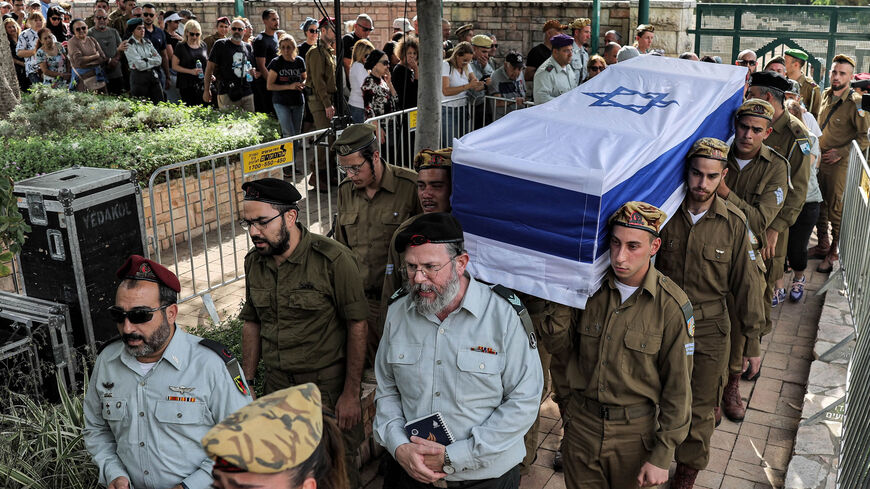Israeli security experts believe that the strategic cooperation with Egypt will not be harmed by a deadly incident on Saturday morning when an Egyptian policeman crossed the border fence and killed three Israel Defense Forces (IDF) soldiers on Israeli territory.
The attack, unprecedented in its nature in over two decades, rattled the Israeli security but it is not expected to boil over and shake the core of the security relationship cemented in the 1979 peace treaty. According to Haaretz, citing security sources, Saturday’s incident caused considerable embarrassment on the Egyptian side.
The incident took place early Saturday morning. An Egyptian policeman infiltrated the security fence on the Israel-Egypt border in the Sinai Peninsula. After passing the border, the policeman shot dead two soldiers while they secured a military post by the fence. A third Israeli soldier and the attacker were killed in an exchange of fire a few hours later, also on Israeli territory.
Soon after the incident, Israel's government called on Cairo to thoroughly investigate the attack. In the ensuing hours, the Egyptian authorities did not openly admit the incident was deliberate, saying the policeman was chasing a drug smuggler into Israeli territory. Still, according to Haaretz citing security sources, in preliminary talks between Israeli and Egyptian military officers at the site, the Egyptians acknowledged an act of aggression, saying that the policeman, usually stationed some 5 kilometers (3 miles) away from the border, had operated alone.
Israel is now calling on Egypt to carry a joint investigation into the attack.
“Israel has conveyed a clear message to the Egyptian government: We expect that the joint investigation will be exhaustive and thorough. This is part of the important security cooperation between us, which has benefited both countries over the years,” said Israeli Prime Minister Benjamin Netanyahu on Sunday.
On Monday morning, Egyptian authorities released more details about the attacker, identifying him as 22-year-old Mohamed Salah. Israel’s public broadcaster KAN reported that Salah had suffered some mental issues after the death of a friend who works in the same military unit as him, and had complained on more than one occasion about his military service. In May 2021, during an IDF operation in the Gaza Strip, Salah expressed on Facebook solidarity with the Palestinians.
Relationship stressed but treaty holds
Experts say Israel and Egypt have a shared interest in keeping their end of the deal, and maintaining a safe border.
"Israel-Egypt bilateral relations as well as the changing regional reality are guiding the interests of both states. In the last few years, Egypt has been heavily involved in mediation efforts with Gaza, in efforts much appreciated by Israel,’’ former Israeli Ambassador to Egypt and lecturer at Reichman University Haim Koren told Al-Monitor.
Koren added that a joint investigation into the circumstances of the incident is in the interest of both countries.
Security cooperation with Egypt is considered a top priority for Israel. The two countries signed a peace treaty in 1979, but for many years, bilateral relations were cold. Few Egyptian tourists have ever visited Israel in the years since the signing of the peace treaty. That being said, in the last decade, since the rise of Egyptian President Abdel Fattah al-Sisi, strategic ties between the two countries have deepened and expanded, both in the domain of security and in the domain of energy.
The Egyptians are interested in cooperating with Israel on battling jihadist groups (Islamic State and al-Qaeda-affiliated) in the Sinai Peninsula and in guaranteeing calm in the Gaza Strip.
Reports in recent years, such as a 2016 Bloomberg report, suggested that Israel was helping Egypt in Sinai both through accurate intelligence and with drone strikes. The Times of Israel reported in 2017 about an ISIS jihadist killed in Sinai by an Israeli drone.
Egypt is concerned that unrest in Gaza could spillover to Egyptian territory. It is also in a constant battle against smuggling networks into and from the Strip.
For Israel, Egypt’s extensive involvement in mediation vis-à-vis Hamas and the Islamic Jihad is of the outmost importance. As such, it was Egyptian mediation that enabled reaching a cease-fire between Gaza and Israel last month.
Israel values cooperation with Egypt also on the regional level. Qatar has been supporting Gaza financially in recent years, with Israel’s agreement. On the other hand, Israel is concerned over the proximity of Hamas and Islamic Jihad with Iran, which places Tehran practically on Israel’s southern border. Security ties with Egypt are key for stability in the region, as far as Israel is concerned.
"The recent Saudi-Iranian agreement also impacts the region with new consequences. To that we must add the return of Syrian President Bashar al-Assad into the fold of the Arab League. As such, Israel and Egypt will both need to see — also together — how to address the changing role of Qatar and of Turkey in this new Middle Eastern game. Both Israel and Egypt must address the emerging 'Iranian axis' and what regional jihadi terrorism would look like, including in the Sinai Peninsula," Koren told Al-Monitor.
Energy cooperation between Israel and Egypt has also become a major topic in bilateral relations. Israeli media had reported extensively on a gesture made by Sisi last February, during a regional energy conference, when he went straight to Israel’s Energy Minister Karin Elharrar, who uses a wheelchair, and thanked her for coming.
Deadly incidents on the Israel-Egypt border are rare. The last one occurred when an Islamic militant cell infiltrated the border in 2011. The assailants fired first at an Israeli bus and then at an Israeli car, killing eight Israeli civilians and wounding 38. In the chase after the assailants and the ensuing exchange of fire, five Egyptian soldiers and two Israeli security agents were killed, alongside seven of the attackers.








